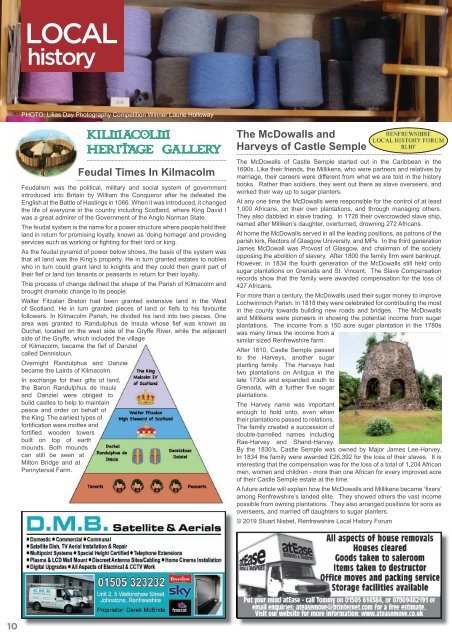298 JULY 19 - Gryffe Advertizer
The Advertizer - Your local community magazine to the Gryffe area. The Advertizer is a local business directory including a what's on guide and other local information and an interesting mix of articles.
The Advertizer - Your local community magazine to the Gryffe area. The Advertizer is a local business directory including a what's on guide and other local information and an interesting mix of articles.
- No tags were found...
Create successful ePaper yourself
Turn your PDF publications into a flip-book with our unique Google optimized e-Paper software.
Next deadline - Friday <strong>19</strong>th July<br />
LOCAL<br />
history<br />
<strong>Gryffe</strong> <strong>Advertizer</strong> | www.advertizer.co.uk<br />
PHOTO: Lilias Day Photography Competition Winner Laurie Holloway<br />
The McDowalls and<br />
Harveys of Castle Semple<br />
Feudal Times In Kilmacolm<br />
Feudalism was the political, military and social system of government<br />
introduced into Britain by William the Conqueror after he defeated the<br />
English at the Battle of Hastings in 1066. When it was introduced, it changed<br />
the life of everyone in the country including Scotland, where King David I<br />
was a great admirer of the Government of the Anglo Norman State.<br />
The feudal system is the name for a power structure where people held their<br />
land in return for promising loyalty, known as ‘doing homage’ and providing<br />
services such as working or fighting for their lord or king.<br />
As the feudal pyramid of power below shows, the basis of the system was<br />
that all land was the King’s property. He in turn granted estates to nobles<br />
who in turn could grant land to knights and they could then grant part of<br />
their fi ef or land ton tenants or peasants in return for their loyalty.<br />
This process of change defi ned the shape of the Parish of Kilmacolm and<br />
brought dramatic change to its people.<br />
Walter Fitzalan Breton had been granted extensive land in the West<br />
of Scotland. He in turn granted pieces of land or fiefs to his favourite<br />
followers. In Kilmacolm Parish, he divided his land into two pieces. One<br />
area was granted to Randulphus de Insula whose fief was known as<br />
Duchal, located on the west side of the <strong>Gryffe</strong> River, while the adjacent<br />
side of the <strong>Gryffe</strong>, which included the village<br />
of Kilmacolm, became the fief of Danziel<br />
called Dennistoun.<br />
Overnight Randulphus and Danziel<br />
became the Lairds of Kilmacolm.<br />
In exchange for their gifts of land,<br />
the Baron Randulphus de Insula<br />
and Danziel were obliged to<br />
build castles to help to maintain<br />
peace and order on behalf of<br />
the King. The earliest types of<br />
fortifi cation were mottes and<br />
fortifi ed wooden towers<br />
built on top of earth<br />
mounds. Both mounds<br />
can still be seen at<br />
Milton Bridge and at<br />
Pennytersal Farm.<br />
The McDowalls of Castle Semple started out in the Caribbean in the<br />
1690s. Like their friends, the Millikens, who were partners and relatives by<br />
marriage, their careers were different from what we are told in the history<br />
books. Rather than soldiers, they went out there as slave overseers, and<br />
worked their way up to sugar planters.<br />
At any one time the McDowalls were responsible for the control of at least<br />
1,000 Africans, on their own plantations, and through managing others.<br />
They also dabbled in slave trading. In 1726 their overcrowded slave ship,<br />
named after Milliken’s daughter, overturned, drowning 272 Africans.<br />
At home the McDowalls served in all the leading positions, as patrons of the<br />
parish kirk, Rectors of Glasgow University, and MPs. In the third generation<br />
James McDowall was Provost of Glasgow, and chairman of the society<br />
opposing the abolition of slavery. After 1800 the family fi rm went bankrupt.<br />
However, in 1834 the fourth generation of the McDowalls still held onto<br />
sugar plantations on Grenada and St. Vincent. The Slave Compensation<br />
records show that the family were awarded compensation for the loss of<br />
427 Africans.<br />
For more than a century, the McDowalls used their sugar money to improve<br />
Lochwinnoch Parish. In 1818 they were celebrated for contributing the most<br />
in the county towards building new roads and bridges. The McDowalls<br />
and Millikens were pioneers in showing the potential income from sugar<br />
plantations. The income from a 150 acre sugar plantation in the 1780s<br />
was many times the income from a<br />
similar sized Renfrewshire farm.<br />
After 1810, Castle Semple passed<br />
to the Harveys, another sugar<br />
planting family. The Harveys had<br />
two plantations on Antigua in the<br />
late 1730s and expanded south to<br />
Grenada, with a further five sugar<br />
plantations.<br />
The Harvey name was important<br />
enough to hold onto, even when<br />
their plantations passed to relations.<br />
The family created a succession of<br />
double-barrelled names including<br />
Rae-Harvey and Shand-Harvey.<br />
By the 1830’s, Castle Semple was owned by Major James Lee-Harvey.<br />
In 1834 the family were awarded £26,392 for the loss of their slaves. It is<br />
interesting that the compensation was for the loss of a total of 1,204 African<br />
men, women and children - more than one African for every improved acre<br />
of their Castle Semple estate at the time.<br />
A future article will explain how the McDowalls and Millikens became ‘fi xers’<br />
among Renfrewshire’s landed elite. They showed others the vast income<br />
possible from owning plantations. They also arranged positions for sons as<br />
overseers, and married off daughters to sugar planters.<br />
© 20<strong>19</strong> Stuart Nisbet, Renfrewshire Local History Forum<br />
10


















